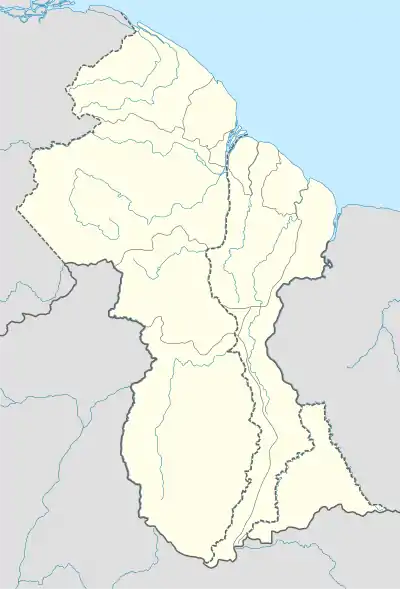Katoonarib
Katoonaru Iribi | |
|---|---|
Village | |
 Katoonarib Location in Guyana | |
| Coordinates: 2°46′03″N 59°34′32″W / 2.7676°N 59.5756°W | |
| Country | |
| Region | Upper Takutu-Upper Essequibo |
| Government | |
| • Toshao | Marcus Alexander[1] |
| Area | |
| • Total | 180 km2 (68 sq mi) |
| Population (2021)[2] | |
| • Total | 382 |
Katoonarib (short for Katoonaru Iribi[1]) is a village in the Upper Takutu-Upper Essequibo Region of Guyana. Katoonarib is inhabited by Wapishana, Macushi and other Amerindians.[2] It is located near the Rupununi River.[3] The main language spoken in the village is Wapishana with English as secondary language.[2]
Overview
The name of the village translates to Bush Island. Katoonarib used to be a satellite of Sawariwau, but has set up its own traditional government.[1] The economy is based on subsistence farming and cattle ranching. The village has a primary school, a health centre, and a community centre.[2] Internet connection is provided via free Wi-Fi.[4] Water is supplied by wells.[5] There is no electricity other than private diesel generators and solar panels.[6]
Transport
Katoonarib can be reached by road from Lethem. A bridge over the Rupununi River was commissioned in 2004.[7] On 27 May 2008, the bridge collapsed under the weight of an excavator.[3]
References
- 1 2 3 "Katoonarib village". Community Lands. Retrieved 4 December 2021.
- 1 2 3 4 5 "Katoonarib". Ministry of Amerindian Affairs. Retrieved 4 December 2021.
- 1 2 "Rupununi River bridge reconstruction on hold 10 months after collapse". Stabroek News. 6 April 2009. Retrieved 4 December 2021.
- ↑ "eGovernment ICT Hubs connected to the eGovernment Network". National Datamanagement Authority. Retrieved 4 December 2021.
- ↑ "Potarinau, Katoonarib get improved water supply". Stabroek News. 23 November 2021. Retrieved 4 December 2021.
- ↑ "A big boost to education in hinterland". Guyana Chronicle. 13 September 2020. Retrieved 4 December 2021.
- ↑ "Rupununi river bridge commissioned". Stabroek News via Land of Six Peoples. 19 February 2004. Retrieved 4 December 2021.